Law Firm Digital Marketing Strategies
There are over 1.3 million licensed attorneys in the United States. Tens of thousands of law firms are fighting for the same clients. The legal market is saturated, and potential clients start their search on Google or an AI platform like ChatGPT well before they pick up the phone.
If your firm isn’t visible in those searches, you don’t exist.
That’s where strategic law firm marketing makes the difference. This guide breaks down the digital strategies that actually work for legal practices. You’ll learn how to attract high-value clients, build trust in a skeptical market, and grow your practice without relying solely on referrals.
Key Takeaways
- Legal marketing requires compliance with bar association ethics rules that don’t apply to other industries.
- Digital strategies like SEO and content marketing generate qualified leads at a lower cost than traditional advertising.
- Trust signals (reviews, credentials, case results) matter more in legal services than almost any other field.
- Multi-channel campaigns combining organic visibility, paid ads, and reputation management deliver the best ROI.
- Tracking performance metrics helps you invest in what works and cut what doesn’t.
Why Do Law Firms Need Marketing?
Running a law firm without marketing is like opening a practice in the desert and expecting clients to find you. They won’t.
Your potential clients are researching multiple firms before making contact. They’re reading reviews, comparing credentials, and looking for proof that you understand their specific problem. If you’re not actively managing your online presence, you’re losing cases to firms that are.
Marketing does three things for law firms:
First, it creates visibility. Your ideal clients need to know you exist before they can hire you.
Second, it builds authority. Publishing helpful content, earning positive reviews, and showcasing your expertise all signal that you’re credible and trustworthy.
Third, it drives qualified leads. Good marketing doesn’t just bring traffic. It brings people who actually need your services.
Word of mouth still matters, but it’s no longer enough. Potential clients want to verify that word of mouth online before they commit. Your digital presence is how they do that.
What Makes Law Firm Marketing Unique?
Legal marketing operates under constraints that don’t apply to most other industries:
- Advertising Restrictions: Every state bar has rules about what lawyers can and cannot say in their marketing. Some prohibit guarantees about outcomes. Others restrict testimonials or case results. You need to know your jurisdiction’s rules before launching any campaign, or you risk disciplinary action.
- High-Stakes Decision Making: Hiring a lawyer is personal. Clients are dealing with divorces, criminal charges, business disputes, or injuries. They’re stressed, skeptical, and risk-averse. They won’t hire you based on a flashy ad. They need proof that you understand their situation and can deliver results.
- Longer Sales Cycle: Legal services aren’t impulse purchases. Potential clients might research for weeks or months before reaching out. Your marketing needs to stay in front of them during that entire window, building trust over time.
- Practice Area Complexity: Marketing for personal injury law looks different than marketing for corporate law or family law. Each practice area attracts different clients with different concerns. A one-size-fits-all strategy doesn’t work.
These factors mean legal marketing has to be clear, ethical, and focused on building credibility. Aggressive tactics backfire. Shortcuts can get you penalized by Google or your state bar.
Digital Marketing Strategies For Law Firms
Digital marketing is where law firms win or lose new clients today. The strategies below consistently generate results for legal practices. Each section includes specific tactics you can implement, along with real examples of how firms are using them effectively.
Law Firm SEO
SEO (search engine optimization) helps your law firm show up organically in search results without paying for every click.
SEO is the foundation of sustainable legal marketing. Unlike paid ads, organic search traffic is free once you’ve earned those rankings. The challenge is that legal SEO is competitive. You’re up against established firms with years of content and backlinks.
Here’s what works for legal SEO:
- Optimize on-page elements for both users and search engines. Your title tags should include your primary keyword and location. Meta descriptions should summarize your value proposition and include a call to action. Header tags should structure your content logically, making it easy for both readers and search crawlers to understand the page hierarchy.
- Create location-specific landing pages for every city or region you serve. A firm with offices in multiple cities needs dedicated pages for each location. Don’t just change the city name and duplicate the content. Each page should include location-specific information: local laws, nearby courts, testimonials from clients in that area, and details about your physical office.
- Build high-quality backlinks from reputable sources. In legal SEO, links from other law firms, legal directories, local news sites, and educational institutions carry more weight than links from random blogs.
- Fix technical SEO issues that hurt your rankings. Slow page load times, broken links, duplicate content, and poor mobile optimization all damage your ability to rank. Run regular technical audits using tools like Screaming Frog or Semrush to identify and fix these issues.
The screenshot below shows what winning local legal SEO looks like. The firm’s Google Business Profile appears in the map pack with reviews, photos, and complete business information. This placement is critical because the map pack appears above organic results for local searches.
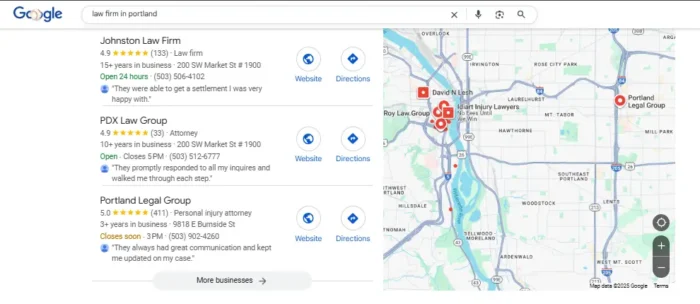
Social Media For Law Firms
Social media content helps law firms stay top of mind, humanize their brand, and reach potential clients where they already spend time. While social platforms aren’t primary lead generation channels for most legal practices, they play an important supporting role in your overall marketing strategy.
The key to legal social media is providing value without crossing ethical boundaries. You can’t share confidential case information. You can’t make misleading claims about results. But you can educate, engage, and build relationships.
Here’s how law firms use social media effectively:
- Focus on platforms where your target clients are active. For consumer-facing practices (family law, personal injury, criminal defense), Facebook and Instagram work well. For business-focused practices (corporate law, employment law), LinkedIn is more effective. YouTube works across the board because video content explains complex legal topics better than text.
- Share educational content that addresses common questions and concerns. Post short explanations of legal concepts, updates on relevant laws, and tips for handling legal situations. A criminal defense firm might share “Your Rights During a Traffic Stop” or “What to Do If You’re Served with a Lawsuit.”.
- Use video to make legal topics accessible. Short-form video performs exceptionally well on social platforms. Film yourself explaining a legal concept in 60 seconds. Show your office and introduce your team. Record client testimonials (with permission and following bar rules). Video humanizes your practice and makes you more relatable than competitors who only post text and stock photos.
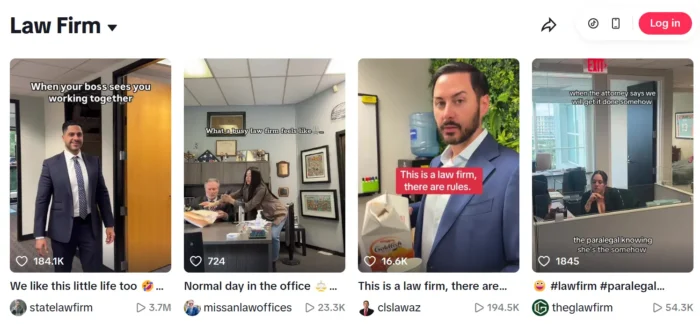
- Engage with your audience through comments and direct messages. Social media is a two-way channel. When someone comments on your post with a question, respond promptly and helpfully. When potential clients reach out via direct message, direct them to schedule a consultation. This responsiveness builds trust and can generate leads.
Law Firm Content Marketing
Content marketing helps law firms educate potential clients, demonstrate authority, and improve SEO.
Content marketing works for law firms because legal services are complicated. Potential clients don’t understand the process, the timeline, or what to expect. They’re searching for answers before they’re ready to hire anyone. If you provide those answers, you become the obvious choice when they’re ready to move forward
Here’s what effective legal content marketing looks like:
- Create detailed blog posts and guides that address specific legal questions. Don’t write generic fluff. Write content that actually helps someone understand their situation. A family law firm might publish “What to Expect During Mediation in a Texas Divorce” or “How to Modify a Child Custody Agreement.” These are specific, actionable, and demonstrate expertise.
- Build practice-area-specific landing pages that target local searches. A personal injury lawyer in Miami needs a page optimized for “Miami car accident lawyer” that explains Florida’s comparative negligence laws, statute of limitations, and what damages clients can recover.
- The screenshot below shows exactly this approach in action. Notice the clear table of contents with headers focusing on different aspects of the probate process.
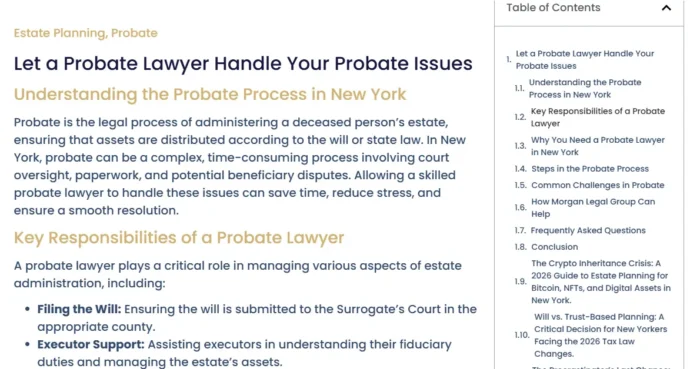
- Develop lead magnets like checklists or downloadable guides. Offer something valuable in exchange for an email address. A criminal defense attorney might offer “10 Things to Do If You’re Arrested” as a downloadable PDF. This builds your email list and establishes authority.
- Update old content regularly to keep it accurate and relevant. Laws change. Case precedents evolve. If your blog post from 2019 references outdated information, it hurts your credibility and your SEO. Review your top-performing content every six months (as a start) and refresh it as needed.
Paid Media for Law Firms
Paid search ads let law firms appear instantly at the top of Google for high-intent keywords. Unlike SEO, which takes months to build, PPC delivers immediate visibility. For competitive legal markets, paid media is often the fastest way to generate leads.
Legal keywords are expensive. Terms like “personal injury lawyer” or “DUI attorney” can cost $50 to $200 per click in major markets. That’s why your campaigns need to be highly targeted and conversion-optimized. You can’t afford to waste budget on broad, low-intent traffic.
Here’s how to make paid media work for legal services:
- Use geo-targeted campaigns to focus on your actual service area. If you’re a divorce lawyer in Austin, don’t waste budget on clicks from Dallas or Houston. Set tight geographic boundaries around the areas where you can take cases. This reduces irrelevant traffic and improves your cost per lead.
- Bid on high-intent keywords that signal immediate need. Someone searching “hire DUI lawyer tonight” or “emergency custody attorney” is ready to act now. These keywords cost more, but they convert at higher rates than informational searches like “what is a DUI.”
- Set up call-only campaigns for mobile users. Over 60% of legal searches happen on mobile devices, and many users prefer to call immediately rather than fill out forms. Call-only ads display a phone number instead of a website link, making it easy for mobile searchers to connect with your firm right away. The example below demonstrates this perfectly. The firms use location extensions (address and map), call extensions (phone number), and sitelink extensions to maximize their ad’s real estate and provide multiple paths for potential clients to take action.
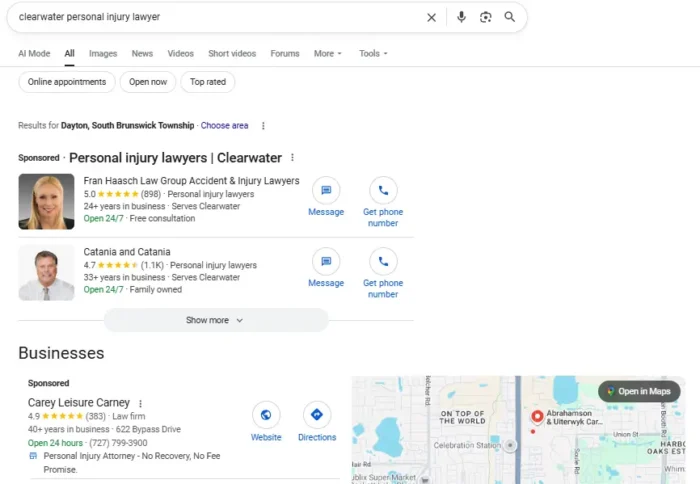
- Track conversions beyond clicks. Use call tracking software to measure which keywords drive phone inquiries. Connect your PPC platform to your CRM so you can see which campaigns generate actual consultations and signed clients, not just website visits.
Law Firm LLM Marketing
AI-powered search is changing how people find legal help. Tools like ChatGPT and Google’s AI Overviews pull information directly from web content and display it without sending users to websites. For law firms, this means your content needs to be structured so AI can find it, understand it, and cite it.
LLM marketing means optimizing for these AI-driven search experiences. You’re not just trying to rank on page one anymore. You’re trying to become the source that AI tools reference when someone asks a legal question, whether it’s on or off Google.
Here’s what actually works:
- Write content that directly answers common legal questions. Don’t bury the answer three paragraphs in. Start with a clear, concise response, then expand with details. AI tools favor content that gets to the point quickly.
- Use schema markup to help AI understand your content structure. Schema tells search engines (and AI) what your content is about: whether it’s a how-to guide, a FAQ, a service page, or something else. This makes it easier for AI to pull the right information.
- Focus on E-E-A-T (Experience, Expertise, Authority, Trustworthiness). Google’s search quality guidelines emphasize these factors, and AI tools are trained on similar principles. Showcase your credentials, cite your sources, and demonstrate real-world experience with the cases you discuss.
- Target long-tail, question-based keywords. People ask AI tools questions the same way they’d ask a lawyer: “What happens if I get a DUI in California?” or “How long does a divorce take in Texas?” Create content that mirrors these natural queries.
Look at the example below. AI Overviews now surface legal information directly in search results by pulling from multiple authoritative sources. One way a personal injury firm could earn placement for a query like this is by publishing comprehensive guides that answer common accident questions with clear structure and proper schema markup.
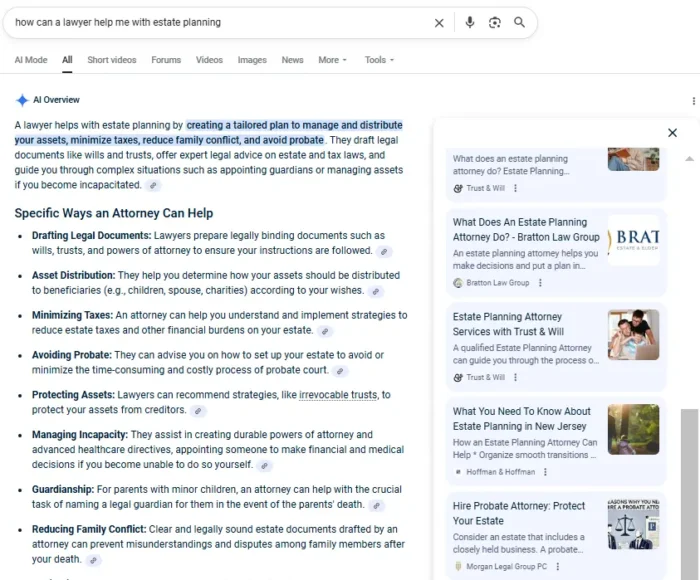
Email Marketing For Law Firms
Email marketing is one of the most underutilized channels in legal marketing. Many firms assume people don’t want to hear from lawyers via email, but that’s not true. If you’re providing value, people will open your emails.
Email works because it keeps your firm top of mind during the long decision-making process that legal services require. Someone might visit your website, read a blog post, and then not be ready to hire you for another three months. Email lets you stay connected during that time.
Here’s how to build an effective email marketing strategy for your law firm:
- Segment your email list by practice area and stage in the client journey. Don’t send the same email to everyone. A personal injury lead who downloaded your “Car Accident Checklist” needs different content than a business owner who attended your webinar on employment law. Segment your list so you can send relevant, targeted messages.
- Create automated email sequences for lead nurturing. When someone downloads a lead magnet or fills out a contact form, trigger an automated sequence that provides additional value over the next few weeks. For example, a family law firm might send a series of emails covering “Preparing for Your First Divorce Consultation,” “Understanding Texas Community Property Laws,” and “What to Expect in Mediation.”
- Share valuable content in your newsletters, not just promotional messages. The email example below gets this right. It includes a personal message from an attorney, links to recent blog posts, a featured case study, and upcoming events.

- Always include a clear call to action. Every email should guide recipients toward a next step: schedule a consultation, download a resource, read a related blog post, or call your office. Make it easy for interested recipients to take action.
Law Firm Reputation Management
Your online reputation can make or break your ability to attract new clients. Studies show that 97% of consumers read online reviews before choosing a local business, and legal services are no exception. Potential clients research your firm’s reviews before reaching out.
Reputation management is about actively monitoring and influencing what people find when they search for your firm online. This isn’t necessarily about hiding negative feedback (which is impossible and often unethical), but building enough positive reviews and content that a few negative comments don’t dominate your online presence.
Here’s how law firms manage their reputation effectively:
- Ask satisfied clients for reviews at the right time. The best time to request a review is right after a successful outcome, when clients are most grateful and engaged. Make the process easy by sending a direct link to your Google Business Profile or preferred review platform. Don’t offer incentives for positive reviews (this violates most platform policies).
- Respond to all reviews, both positive and negative. Thank clients who leave positive reviews. For negative reviews, respond professionally and avoid getting defensive. Your response shows future clients how you handle criticism and difficult situations.
- Monitor your firm’s online mentions across the web. Set up Google Alerts for your firm name and key attorneys. Check legal directories, social media, and review platforms regularly. If you find inaccurate information or fake reviews, report them to the platform. If you find negative but legitimate feedback, use it as an opportunity to improve your client experience.
- Showcase testimonials and case results on your website, social media, and Google Business Profile (while following bar association rules). Look at the example below. This firm has over 500 reviews with a 4.8-star average, demonstrating consistent client satisfaction over time. The reviews are recent, which carries more weight with potential clients. The visible
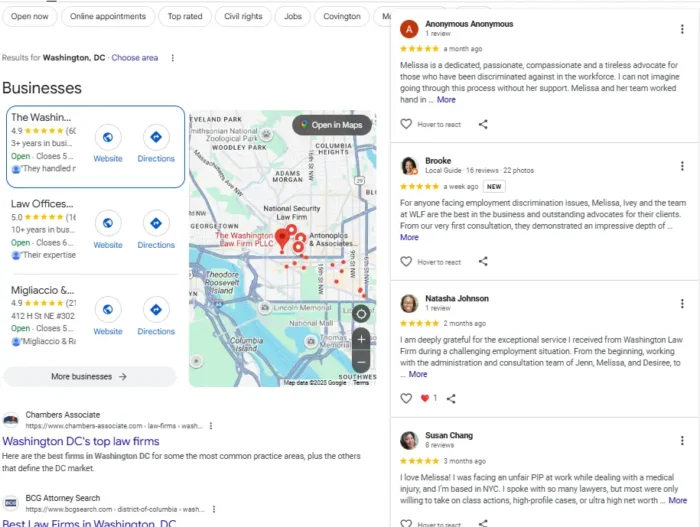
Law Firm Website UX
Your website is often your first impression with potential clients. If it’s slow, confusing, or unprofessional, you’ve lost them before any real interaction happens. Good website UX (user experience) makes it easy for visitors to find information, trust your expertise, and contact you.
Law firm websites need to balance professionalism with accessibility. You want to appear credible and authoritative, but not intimidating or corporate. You want to showcase your expertise, but not overwhelm visitors with legal jargon.
Here’s what makes a law firm website effective:
- Use clear, prominent calls to action. Every page should make it obvious how to contact you. “Schedule a Free Consultation” or “Call Now” buttons should be visible without scrolling. Include your phone number in the header of every page, especially for mobile users who want to call immediately.
- Keep navigation simple and intuitive. Potential clients should be able to find practice area pages, attorney bios, and contact information within two clicks from the homepage. Avoid dropdown menus with too many options. Use clear labels that describe what visitors will find (not clever marketing language that confuses people).
- Display trust signals above the fold. Show your credentials, years of experience, number of cases won, bar memberships, and awards in prominent locations. Potential clients need to see evidence of your expertise and track record before they’ll trust you with their case.
- Optimize for mobile devices. Your website needs to load quickly, display correctly on small screens, and make it easy to call or fill out forms from a phone. Test your site on multiple devices to ensure the experience is smooth everywhere.
Measuring Your Law Firm Marketing Success
If you’re not tracking results, you’re guessing. Law firm marketing requires measurement to know what’s working and where to invest more resources.
Here are the key performance indicators every law firm should monitor:
Website traffic and traffic sources: Use Google Analytics to track how many people visit your site and where they come from (organic search, paid ads, social media, referrals). This tells you which channels drive the most visitors and helps you allocate budget effectively.
Keyword rankings: Monitor your positions for target keywords using tools like Semrush or Ubersuggest. Track both your overall visibility and specific rankings for high-value terms in your practice areas. Regular ranking reports show whether your SEO efforts are paying off.
Lead volume and quality: Count how many leads you generate each month through different channels (contact forms, phone calls, chat messages, consultation requests). But don’t just count quantity. Track lead quality by measuring how many leads turn into consultations and how many consultations become clients.
Cost per lead and cost per client: For paid campaigns, calculate how much you spend to acquire each lead and each new client. This ROI data helps you decide which campaigns to scale and which to pause. A channel that generates cheap leads but low conversion rates might be less valuable than one with higher costs but better-qualified prospects.
Review volume and ratings: Track your review count and average rating across platforms over time. Growing review volume signals that your reputation management efforts are working. Declining ratings indicate potential service issues that need attention.
Use tools like Google Looker Studio to build dashboards that centralize all this data. Having everything in one place makes it easier to spot trends, make decisions, and report results to partners or stakeholders.
FAQs
What is law firm marketing?
Law firm marketing refers to the strategies and tactics used to attract, engage, and convert clients for a legal practice. It includes SEO, content marketing, PPC, social media, and reputation management.
How do you market a law firm effectively?
Focus on your ideal client. Build trust through content, reviews, and clear communication. Invest in SEO and paid search to get in front of people actively looking for help. Track your results and adjust as needed.
How much does law firm marketing cost?
Costs vary based on location, competition, and strategy. Solo attorneys might spend $1,000/month, while larger firms can invest $10,000+ monthly. Start with what fits your goals and scale as you grow.
Conclusion
Effective law firm marketing separates the practices that grow from those that struggle. Visibility, credibility, and consistent lead generation don’t happen by accident. They require strategy, execution, and ongoing optimization.
Start with one or two channels where your ideal clients spend time. Build your foundation with SEO and a strong website. Add paid advertising for immediate results. Strengthen your reputation through reviews and client testimonials. Track everything so you know what’s driving results.
If you need help building a marketing strategy that brings in qualified clients, NP Digital’s consulting services can help you develop and execute a plan tailored to your practice.
Ready to grow your firm? Let’s make it happen.